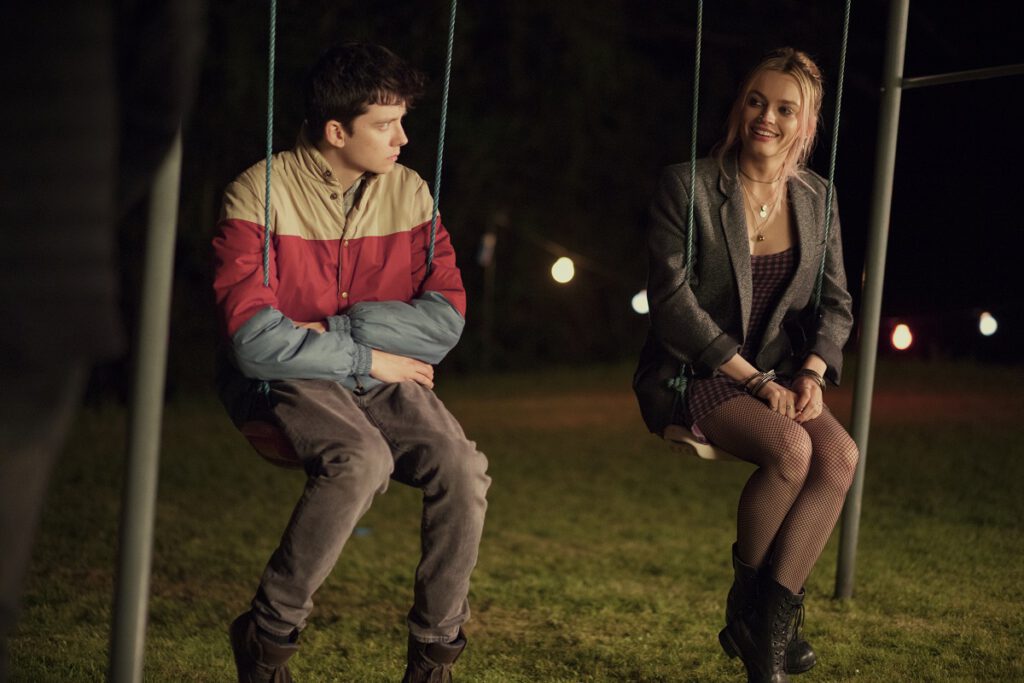To find out what works, you have to try things. Some of those things will be awkward. Some will fail. Some will work, and so maybe you lean into those things. To learn what’s right for you, you have to be ready to experiment. That’s true of sex, and of love, and of storytelling. It’s certainly true of “Sex Education,” the new Netflix series from Laurie Nunn. Not everything in these initial eight episodes could be called effective, and some of it is downright gawky. But as the series progresses; as the performances of Asa Butterfield, Gillian Anderson, and the rest of the cast grow more layered; and as “Sex Education” becomes more confident and aware of what it is and what it wants, it starts to feel great. It feels healthy and funny and sexy and complicated and sad. And perhaps most importantly, it feels like a story well-told.
The story in question: What happens when the sexually repressed teenage son of a sex therapist decides to start doling out some counseling of his own to his fellow high-schoolers? Otis (Butterfield) begins to explore that question at the behest of classmate Maeve (Emma Mackey), an intelligent young woman with a cultivated tough-girl exterior she uses to deflect some of the cruelties hurled at her by the other students. He’s encouraged in this by his best friend Eric (Ncuti Gatwa), an openly gay student whose eagerness to embrace life acts as a kind of armor of his own. What Otis lacks in sexual experience of his own, he makes up for in empathy and secondhand knowledge, the latter accrued over years of living with his mother Jean (Anderson). But as some of the many students who come to him for advice will learn, Otis also picked up his mother’s struggles with healthy communication and blind spots—issues with which his friends will become intimately and sometimes distressingly familiar.

If the setup “virginal teen offers effective sex and relationship counseling to fellow students in exchange for money” sounds farfetched to you, it’s with good reason. “Sex Education” absolutely requires a willingness to accept the premise and move on. The series makes that relatively easy to do, thanks to two major factors: grounded performances that acknowledge and embrace the absurdity, and the embrace of a familiar, comfortable framework. We’ll return to the acting, but let’s begin with the unexpected, and surprisingly effective, means through which the story is told. “Sex Education” is a bit of a procedural, and its loose adherence to that form allows the series to reach and explore more than it might otherwise.
Perhaps more importantly, the recognizable cues of the procedural make it easier to take the leap the show asks. Yes, it’s absurd, but “Sex Education” isn’t interested in realism. As every episode begins, we’re shown a brief scene from the life of one of Otis and Maeve’s classmates, a scene tied in some way to their particular struggle. Adam (Connor Swindells) can’t climax. Lily (Tanya Reynolds) is just dying to lose her virginity. Ruby (Mimi Keene) doesn’t know what to do about a nude photo that’s been leaked. The list goes on. Because this is a high school, and not the New York of “Law & Order,” most of these characters return, dancing around the periphery if not playing a significant supporting role. Yet even if the characters have continuing stories, their sex-problem-of-the-week stories allow the series to tackle a wide range of issues with some thoughtfulness, getting in, exploring, and getting out with speed.
That’s a feat accomplished in part because the cast is almost uniformly good. Butterfield, extremely well cast in his role, makes this emotional teenage savant feel not just engaging to watch, but almost entirely plausible; it takes a scene of him talking another teenager off the ledge of a sparkly fake moon at a school dance to render his powers insufficient. Like his character, Butterfield is a great listener—as good as he is when he’s the center of a scene, his silent reactions might be even better. The same can be said of Anderson, whose delivery of Jean’s often uncomfortably frank dialogue occasionally (and appealingly) approaches camp territory, but whose scenes contemplating her son in his absence are among the show’s best. Several in the supporting cast also excel, notably Mackey, Reynolds, Kedar Williams-Stirling (as Maeve’s paramour Jackson), and especially Gatwa, who leaps wholeheartedly into Eric’s more playful scenes and plays those that ache with admirable, effective restraint.

Such restraint is invaluable, because while “Sex Education” benefits from the quality of its cast and the form of its overall structure, it is occasionally hindered by writing and direction. Perhaps more than any other member of the cast, Gatwa seems to identify the moments that could easily go too far, underplaying scenes grounded in a few particularly hoary tropes. If actors like Gatwa can compensate for such stumbles, there are others, Alistair Petrie as the sneering school headmaster in particular, that seem to highlight the show’s shortcomings. “Sex Education” makes some pretty bit tonal leaps, and most of them are successful; nearly all of them that don’t are linked by broad performances and writing that, if not exactly harmful, is considerably less thoughtful than the whole.
There’s a similar tension in the direction, a few big swings that don’t work as well as those that precede and follow, including a couple unexpectedly surreal moments that seem to have sprung straight from a fan-edited version of “Trainspotting”. By and large, however, directors Kate Herron and Ben Taylor exercise a restraint that mirrors that of the performers, allowing the cast to unpack the complexities of the relationships while the camera uncovers the isolation and loneliness of life as a teenager through shots that highlight isolation, distance, and smallness. Two bikers pedal down a long, empty road, glimpsed from far, far above. Two teenagers open lockers side by side, standing close together yet separated by a solid, black wall. A young man briefly walks away from his coat to ask for directions, and the camera pans with him; when he and the camera return, the coat is gone, and he’s alone. It’s smart stuff, with roots in the emotional lives of these kids. That focus allows even the most ridiculous moments to feel rooted in something genuine.
“Sex Education” won’t be for everybody. The humor is often very dark, the awkwardness so cringe-inducing it can be difficult to watch. But like a well-meaning teen therapist, its intentions are so good that it’s difficult to hold much against the series. Like a generous partner, it’s willing to experiment and find a balance that works. And like sex—like good sex anyway—it’s often an absolute pleasure.
Full season screened for review.












